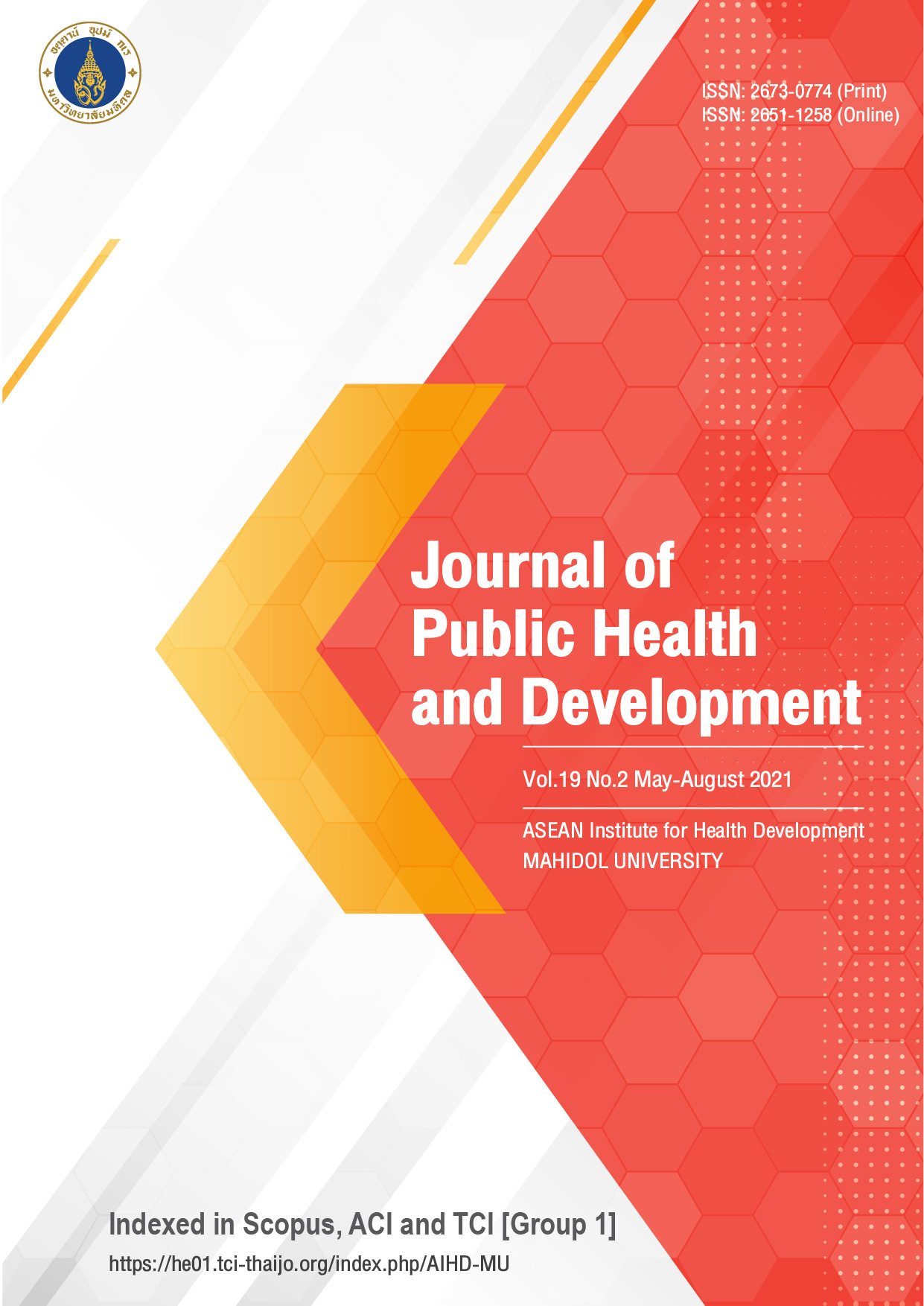The Effectiveness of the Health Promotion Program for the Development of Elderly Health literacy and Quality of Life in the Princess Maha Chakri Sirindhorn Medical Center’s Area of Responsibility
Main Article Content
Abstract
This quasi-experimental research study was conducted to measure the effectiveness of the health promotion program for the development of elderly health literacy and elderly quality of life in the HRH Princess Maha Chakri Sirindhorn Medical Center's area of responsibility. The sample consisted of elderly males and females living in the Ongkharak district, Nakhon Nayok Province. These individuals were divided into a control and an experimental group, each consisting of 46 people who were selected by the specified criteria. The health promotion program was developed by applying the quality of life concept together with health literacy, the World Health Organization (WHO)'s Quality of Life Assessment (WHOQOL-BREF-THAI), and the Health Literacy and Behavioral Evaluation according to the 3E2S of the Health Education Division, Thailand’s Ministry of Public Health. The statistics measured in this study were percentage, mean score, standard deviation, and t-test. The results indicated that, after completion of the health promotion program, the members of the experimental group had a better quality of life compared to the control group, statistically significant at 0.01 level. Also, after completing the health promotion program, the members of the experimental group had better health literacy and health behavior according to the 3E2S than the control group, statistically significant at the level of 0.01.
Article Details

This work is licensed under a Creative Commons Attribution-NonCommercial-NoDerivatives 4.0 International License.
References
Kriphibun P.Elderly health. Haamor.com [Internet]. 2014. [cited 2020 May 20]. Available from: http:// haamor.com/th/
Estimated Population at Mid–2014. Institute for Population and Social Research, Mahidol University. 2010.
Lane J. The Art of Ageing: Inspiration for a Positive and Abundant Later Life. Totnes,United Kingdom: Green Books 2010: 23-34.
Charoenkul P. Eldery care. Bangkok: Rung Saeng Printing 2012.
Bhikkhu B. Spiritual health. Bangkok: Rung Saeng Printing 2012.
World Health Organization. Division of Mental Health. WHOQOL-BREF: introduction, administration, scoring, and generic version of assessment: file trial version. World Health Organization 1995.
Sharma R. Population and socio-economic development population trends resources and environment: handbook. New Delhi 1975.
World Health Organization. Ottawa charter for health promotion: an international conference on health promotion [Internet]. 1986 Nov 17-21; Ottawa: Ontario, Canada; 1986 [cited 2020 May 20]. Available from: https://www.canada.ca/en/public-health/services/health-promotion/ population-health/ottawa-charter-health-promotion-international-conference-on-health-promotion.html.
Rodchakpai Y. Health promotion theories and concepts. Chonburi: Hoko Press; 2011.
Pradeep GC, Tiraphat S, Chompikul J. Factors associated with quality of life among the elderly in Baglung District, Nepal J Pub. Health Dev 2017;15(3): 51-64.
Nutbeam D. The evolving concept of health literacy. Social Science & Medicine 2008;67(12):2072-8.
Journal of The Secretariat of The Prime Minister(Chan - o - cha P) [Internet]. 2017. Available from: https://spm. thaigov.go.th/FILEROOM/spm-thaigov/DRAWER004/GENERAL/ DATA0000/00000368.PDF
Phosri S. Statistic for research. Bangkok: Publishing house of Chulalongkorn University; 2006:70-2.
Orem D.E. Nursing: Concepts of practice. 5th ed. St. Louis, MO: C. V. Mosby 1995:103-4.
Pender NJ, Murdaugh C, Parsons MA. Health promotion in nursing practice. 4th ed. New Jersey : Pearson Education, Inc USA: Prentice-Hall Health 2002:140-5.
Roger CR. Client-centered therapy. Boston: Houghton Mifflin 1959.
Sapkaew Y. The development of elderly's quality of life by using the elderly school curriculum. The Excellent Center in Health Promotion of Elderly, Boromarajonani College of Nursing Nakhon Si Thammarat. JNAE 2016;9:25-39.
Panyasai K, Kitisri C, Ngerndee P. Effectiveness of health promotion programs for quality of life basic need among the elderly. PHJBUU 2017;12(2):65-75.
Suwannarat J, Panyasai K. Effectiveness model of participation health promotion for quality of life among the elderly. PHJBUU 2019; 14(2):52-62.
Ounnapiruk L, Wirojratana V, Kongsuriyanavin W, Termsettajaroen W. The effectiveness of a health promotion program on quality of life of elderly people in the elderly club. J Nurs Sci 2012;30(2):35-45.


